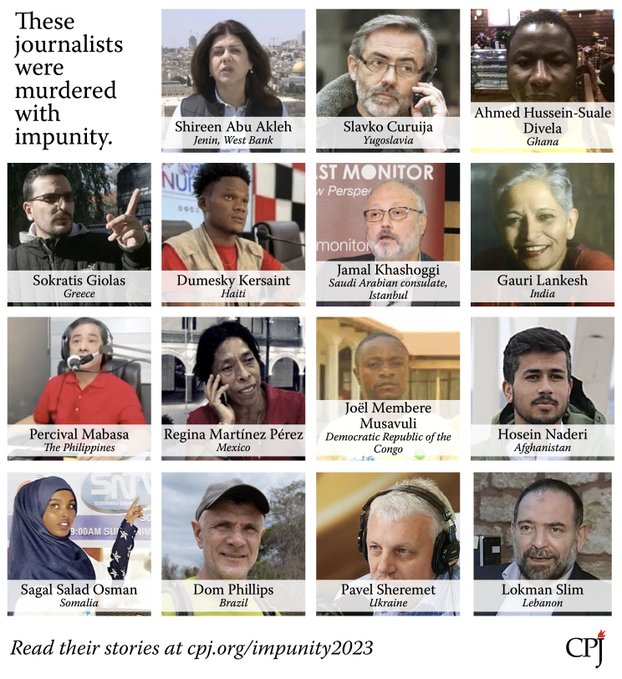Cubans, Ethiopians, Southeast Asians Just a Few
N.Y. Times Writer Out After Pro-Palestinian Letter
After Visit, Coates Sees Israel as Apartheid Regime
In Poll, Blacks Feel Good About Local Journalists
Police Kept Truth From Family of Man Police Killed
NAHJ Honors Report on Moms Fighting Pollution
With Jim Trotter Comments, Stephen A. Loses a Fan
It’s About Relationships — and Funding
Short Takes: News Leaders Association and diversity; Conde Nast layoffs; Sahan Journal; Al Dia Philadelphia; Arnold Diaz; “The Melanin Report”; Adrienne Broaddus; corporal punishment in Kenyan classrooms; El Salvador’s repeal on gang messages; Bangladesh journalists attacked; DemocraCredittic Republic of Congo; countering offensive broadcasts in Ghana.
Homepage photo credit: Committee to Protect Journalists
Support Journal-ismsDonations are tax-deductible.
In accepting an international press freedom award last year from the Committee to Protect Journalists, Abraham Jiménez Enoa said, “There is no possible way to leave us without a voice. We Cuban journalists are going to denounce its excesses until the last second of the life of the Cuban dictatorship, even if we have to pay a very high price for it.” He dedicated his award “to Cuban reporters Lázaro Yuri Valle Roca and Jorge Bello Domínguez, who are in a regime dungeon,” reported Cubanos por el Mundo.
Cubans, Ethiopians, Southeast Asians Just a Few
“It was an unbearable life,” said exiled Cuban journalist Abraham Jiménez Enoa. “As time went by, I was left without oxygen. My daily life was kidnappings, arbitrary detentions in prisons, interrogations, house arrests, interventions in my private communication. I was under surveillance wherever I went. My friends and family members were also pursued and interrogated, and taken to jail cells.
“My parents and one of my sisters lost their jobs as retaliation for the journalism that I did.” Jiménez now lives in Spain, and was one of five exiled journalists profiled Tuesday by The Dial two days before the United Nations-declared International Day to End Impunity for Crimes against Journalists.
The U.N. noted that 117 journalists were killed in 2020-2021 and that in 2020 and 2021, Latin America and the Caribbean accounted for 38% of killings, followed by Asia and the Pacific with 32%. In 2021, the percentage of women among all journalists killed almost doubled, rising to 11% from 6% the previous year.
“Ending impunity for crimes against journalists is one of the most important and complex challenges of recent times,” the U.N. said. “It is an essential precondition to guarantee freedom of expression and access to information for all citizens.”
In the United States, commemoration of the day was relatively muted. However, the Society for Professional Journalists said, “SPJ encourages journalists around the country to remember journalists who have been killed in action on Nov. 2. It also calls on the United States government to continue to pressure other countries to seek out, arrest and prosecute those who threaten and murder journalists.”
Secretary of State Antony Blinken noted the commemoration. “Corruption and abuse of power thrive where the free and independent press is suppressed,” he said in a statement.
“Violence, spurious detentions, harassment, and acts of intimidation against media workers carry a tangible harm to both the individual and to society at large. Combatting impunity for violence against journalists is a key line of effort under the Department’s Journalism Protection Platform, announced at the first Summit for Democracy. We call on governments globally to bring to justice those responsible for crimes against journalists, so that they may continue their important work shining the light of truth free from fear of violence or harassment.”

The Dial also profiled Ayham al Sati, a journalist from Syria now in Spain; Ethiopian journalist Tamerat Negera, now in Washington, D.C.; Saw Chit Aye of Myanmar or Burma, now at the Thai border; and Annie Zhang, who left Hong Kong for Taiwan, “before exile could be imposed on her,” The Dial said.
Jiménez said of the Cuban government, “Another one of the measures the government took against me, to force my silence, was to prevent me from leaving the country.
“They didn’t let me have a passport, and I was shut away in the island without being able to leave it, living in a kind of political prison. For that reason, when the country exploded and people went out to the streets in mass protest, in the summer of 2021, the government decided to give me a call. I was one of the few journalists who narrated those protests from the inside.
“In that telephone call, they told me that they’d grant me my passport so that I’d leave the country, and if I didn’t they’d lock me up. They offered me exile or jail to finally get rid of me. Obviously I chose exile. That’s why I’m here now and can’t return.”
By coincidence, The Nation this week published an interview with Cuban president Miguel Díaz-Canel, “marking the leader’s first-ever interview in the United States and his first longform exchange with an English-language outlet.”
But none of the questions from Katrina vanden Heuvel, editorial director and publisher, and Nation editor D.D. Guttenplan, touched on human rights or press freedoms.
Vanden Heuvel did ask about the U.S. economic embargo of Cuba, which she said is “brutal, of course.” The U.N. General Assembly voted overwhelmingly Thursday to condemn the embargo of Cuba for a 31st year,” Edith M. Lederer reported for the Associated Press.
“U.S. deputy ambassador Paul Folmsbee told the assembly after the vote that the United States stands by its sanctions, which are ‘one set of tools in our broader effort toward Cuba to advance democracy and promote respect for human rights and fundamental freedoms.’ ”
“He said approximately 1,000 political prisoners remain behind bars in Cuba, more than at any point in its recent history.”
Jimenez has told Journal-isms, “I am against the US blockade and I am against the Cuban dictatorship. One thing has nothing to do with the other.”
 Another Afro-Cuban journalist, Serafin Morán pictured), who won asylum in the United States in 2018, maintains that “there really is no blockade. They do not block Cuba at all, neither economically nor anything,” he messaged Journal-isms. “In fact, here in the United States, products from Cuba are sold, such as coffee and beer. Several brands of beer are still recognized as being Cuban, such as the so-called Palma, which is really a Cuban beer.”
Another Afro-Cuban journalist, Serafin Morán pictured), who won asylum in the United States in 2018, maintains that “there really is no blockade. They do not block Cuba at all, neither economically nor anything,” he messaged Journal-isms. “In fact, here in the United States, products from Cuba are sold, such as coffee and beer. Several brands of beer are still recognized as being Cuban, such as the so-called Palma, which is really a Cuban beer.”
Moreover, he said, high-ranking officials drive 2023 and 2022 model cars and “they do not allow citizens to have a vehicle even if their relatives can send it to them.”
Cuba ranks 172 of 180 countries on this year’s Reporters Without Borders’ World Press Freedom Index. “Cuba remains, year in and year out, the worst country for press freedom in Latin America,” the organization said.
- Amnesty International: Saudi Arabia: Still no justice for state-sanctioned murder of Jamal Khashoggi five years on (Sept. 29)
- Karen Attiah, Washington Post: The moment I knew the world would try to move on from Jamal Khashoggi (Oct. 1)
- Million Beyene, Addis Standard, Ethiopia: Ethiopia’s press freedom crisis: Arrests, exile of Journalists intensify amid political turmoil
- Dabanga: Sudanese journalists demand justice for the killing of Halima Idris on Int’l Day to End Impunity
- European Centre for Press and Media Freedom: End Impunity for Crimes Against Journalists
- Arlene Getz, Committee to Protect Journalists: Haiti joins list of countries where killers of journalists most likely to go unpunished
- Silvia Higuera, LatAm Journalism Review: Cuban journalist Serafín Morán granted asylum in the United States (Oct. 16, 2018)
- International Federation of Journalists: Impunity: Silence costs lives
- International Federation of Journalists: IFJBlog: Impunity for Crimes Against Journalists: Where does Pakistan stand? (Nov. 9)
- Muhammad Jawad, BNN Breaking, Hong Kong: Exiled Journalists: The World Watches as Our Lives Slowly Fade Away (three months ago)
- Abraham Jiménez Enoa, Washington Post: Cuba is far more fragile than you think (May 24)
- Abraham Jiménez Enoa, El Diario, Spain: Blacks, flee and you will live
- Journal-isms: U.S. Media Downplay Threats to Latin Colleagues (June 11, 2022)
- Knight Center, LatAm Journalism Review: Justice in crimes against Latin American journalists demands long fight
- Mateo Orozco, Cubanos Por El Mundo: The health of Lázaro Yuri Valle Roca in prison is complicated again: “The kind of tumor has come out again,” said his wife (Jan. 4)
- Radio-Television Marti: Audio stories
- Fabiola Santiago, Miami Herald: Sen. Bob Menendez can be both corrupt and right about Cuba’s human-rights abuses (Sept. 29)
- Society of Professional Journalists: SPJ celebrates International Day To End Impunity For Crimes Against Journalists
- Ishaan Tharoor, Washington Post: Five years after Khashoggi murder, lots of geopolitics, little justice
- Lucero Villalba, Cubanos por el Mundo: Abraham Jiménez Enoa dedicates his International Press Freedom Award to Cuban journalists repressed by the regime (+VIDEO) (Nov. 18, 2022)
- Andrew Zhang, Politico: [Jake] Sullivan condemns reported attack on Cuban embassy in Washington (Sept. 25)
N.Y. Times Writer Out After Pro-Palestinian Letter
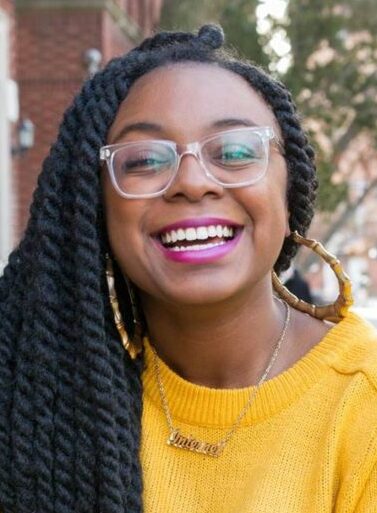 “New York Times Magazine writer Jazmine Hughes (pictured) resigned from the news giant on Friday after a conversation with her editor over signing a letter opposing the Israel-Gaza war from Writers Against the War on Gaza, which was a violation of newsroom policies, according to the Times,” Mike Roe reported Friday for The Wrap. “The letter voiced support for Palestinians and opposition to Israel’s siege of Gaza.
“New York Times Magazine writer Jazmine Hughes (pictured) resigned from the news giant on Friday after a conversation with her editor over signing a letter opposing the Israel-Gaza war from Writers Against the War on Gaza, which was a violation of newsroom policies, according to the Times,” Mike Roe reported Friday for The Wrap. “The letter voiced support for Palestinians and opposition to Israel’s siege of Gaza.
“ ‘While I respect that she has strong convictions, this was a clear violation of The Times’s policy on public protest,’ New York Times Magazine editor Jake Silverstein wrote in an email to staff Friday evening. ‘This policy, which I fully support, is an important part of our commitment to independence.’
“According to Silverstein, Hughes had violated the news institution’s rules earlier this year when she signed another public letter that expressed concerns about how the newspaper covered transgender issues. That letter was also signed by other Times contributors.
“ ‘She and I discussed that her desire to stake out this kind of public position and join in public protests isn’t compatible with being a journalist at The Times, and we both came to the conclusion that she should resign,’ Silverstein said in his email to staff.
“Hughes, who was with the Times since 2015, declined to comment on her resignation. The anti-Gaza letter was also signed by contributing New York Times Magazine writer Jamie Lauren Keiles, along with numerous other writers, including journalists from the Los Angeles Times, Jewish Currents, Al Jazeera, Vox Media, New York Magazine and elsewhere. Keiles said in a post on X (formerly Twitter) he would no longer contribute to the Times, noting that it was ‘a personal decision about what kind of work I want to be able to do.’ . . . “
Keiles added, “i am a religiously observant jew and trans. i use he/him pronouns. please include this in your coverage.”
“Writers Against the War on Gaza describes itself as’ committed to solidarity and the horizon of liberation for the Palestinian people.’ ”
- Martin Baron, Washington Post: We want objective judges and doctors. Why not journalists too? (March 24)
- Leonard Downie Jr., Washington Post: Newsrooms that move beyond ‘objectivity’ can build trust (Jan. 30)
- Alex S. Jones, New York Times: Demonstration Renews Question of Conflict for Newspapers (April 16, 1989)
- Wesley Lowery, Columbia Journalism Review: A Test of the News: Objectivity, democracy, and the American mosaic (April 25)
- David Mastio, New York Post: USA Today demoted me for a tweet — because its woke newsrooms are out of touch with readers (June 23, 2022)
- New York Times: A New Role for Jazmine Hughes (Aug. 12, 2020)
Ta-Nehisi Coates said, “I know that, A, because of my upbringing, and I know that, B, because of my vocation as a journalist, you can’t behold evil and then return and not speak on it. And segregation is evil. There just is no — there’s no way for me, as an African American, to come back and stand before you, to witness segregation and not say anything about it. (Credit: YouTube)
After Visit, Coates Sees Israel as Apartheid Regime
Ta-Nehisi Coates, after spending 10 days in Palestine, in the Occupied Territories and in Israel proper, says he was shocked by how uncomplicated the situation is: Standing with Palestinians is the only choice for the moral and ideological descendants of Martin Luther King Jr., Ida B. Wells and Frederick Douglass, and for students of African American history.
The obviously moved best-selling writer and journalist, now teaching at Howard University, appeared on “Democracy Now!” Thursday even though, as he said, “It is not my nature to talk about things that I have not written about yet.
“But one has to balance one’s responsibility against the suffering, against the death, against the body count,” Coates continued. “And to see what is coming out of this White House right now is just — it’s morally reprehensible. Again, I don’t know how people sleep at night.”
Coates also said, “the way this is reported in the Western media is as though one needs a Ph.D. in Middle Eastern studies to understand the basic morality of holding a people in a situation in which they don’t have basic rights, including the right that we treasure most, the franchise, the right to vote, and then declaring that state a democracy. It’s actually not that hard to understand. It’s actually quite familiar to those of us with a familiarity to African American history.”
In Israel proper, he said, “I had a sentiment that what I was going to see was not going to be great. And I know that, A, because of my upbringing, and I know that, B, because of my vocation as a journalist, you can’t behold evil and then return and not speak on it. And segregation is evil. There just is no — there’s no way for me, as an African American, to come back and stand before you, to witness segregation and not say anything about it.
“One of the hardest things was to come back and then to read the rhetoric of certain African American politicians who are defending this regime. And I just — I couldn’t understand it. You know, I wanted to know if they had been to Hebron. You know, I wanted to know if they had been to Masafer Yatta, if they had been to Susiya, if they had been to Tuba. Had they seen? Had they really seen what is actually happening here?
“I don’t know how anybody who benefits, who stands on the shoulders of our ancestors’ struggle against Jim Crow, against segregation, could see what is happening right now, could see the bombs being dropped, 9,000 people dead, an ungodly number of them children, in service of Jim Crow and segregation, which we have exported, and be OK with that. I don’t — I don’t understand it. . . .”
- Perry Bacon Jr., Washington Post: The movement against Israel’s bombing of Gaza is bottom-up leadership
- Ryan Bort, Rolling Stone: Israeli Govt. Denies Rolling Stone a Press Credential After Critical Coverage
- Alex Griffing, Mediaite: White House Demands Fox News Apologize For Jesse Watters Saying He’s ‘Had It’ with Arab-Americans
- Ruben Navarrette Jr., syndicated: Do Americans support Israelis or Palestinians in the Mideast war? Both, apparently.
- Farah Pandith, Council on Foreign Relations: The U.S. Faces a Public Relations Crisis in the Arab and Muslim World
- Oren Persico and The Seventh Eye, +972 Magazine: Will Israel shut down Al Jazeera?
- Christopher Shell, Responsible Statecraft: What are Black voters looking for in US foreign policy? (Oct. 26)
- Brian Stelter, Hollywood Reporter: “Everyone Wants Us to Pick a Side”: Reporters Grapple With Covering Israel-Hamas War (Oct. 25)
- Robert Zaretsky, Forward: For Israel, a predicament that would be familiar to the authors of Greek tragedy
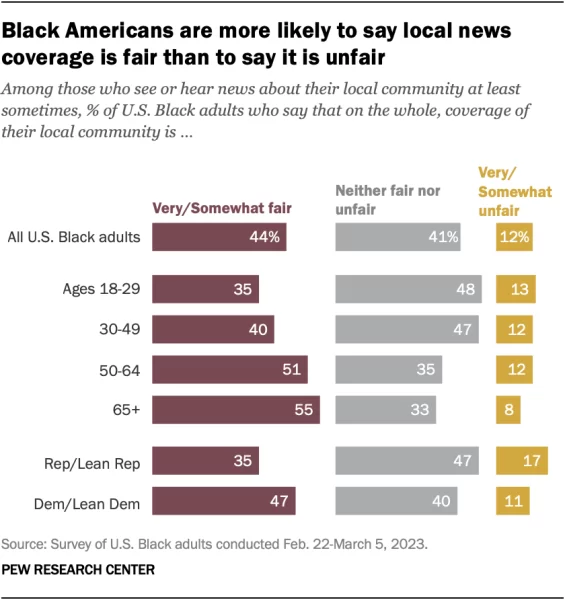
In Poll, Blacks Feel Good About Local Journalists
“Black Americans tend to express more positive than negative views toward local journalists and news coverage,” the Pew Research Center reports.
“For example, Black Americans are more likely to say local journalists are mostly in touch (58%) rather than out of touch (38%) with their local community,” Michael Lipka reported for the center Tuesday. “And among Black adults who see or hear news about their local community at least sometimes, 44% say that on the whole, coverage of their community is very or somewhat fair – compared with just 12% who say it is very or somewhat unfair. About four-in-ten (41%) say the coverage is neither fair nor unfair.
“On both of these questions, older Black Americans are more likely than younger adults to express the more positive view – that journalists are mostly in touch with their community and that local news coverage is generally fair. The same is true for Black Democrats compared with Black Republicans, perhaps reflecting higher levels of trust in the news media in general among Democrats. . . .
- Anika Collier Navaroli, Columbia Journalism Review: Black in Moderation: Without change and further research to find solutions, the tech industry risks failing to attract and retain Black trust and safety workers it urgently needs
Jon Schuppe explains the story to Hallie Jackson on “NBC News Now” on Oct. 25. (Credit: YouTube)
Police Kept Truth From Family of Man Police Killed
“A few weeks ago, a mother in Mississippi called me, very upset, and told me a painful story,” New York-based NBC News enterprise reporter Jon Schuppe (pictured) tweeted Oct. 25.
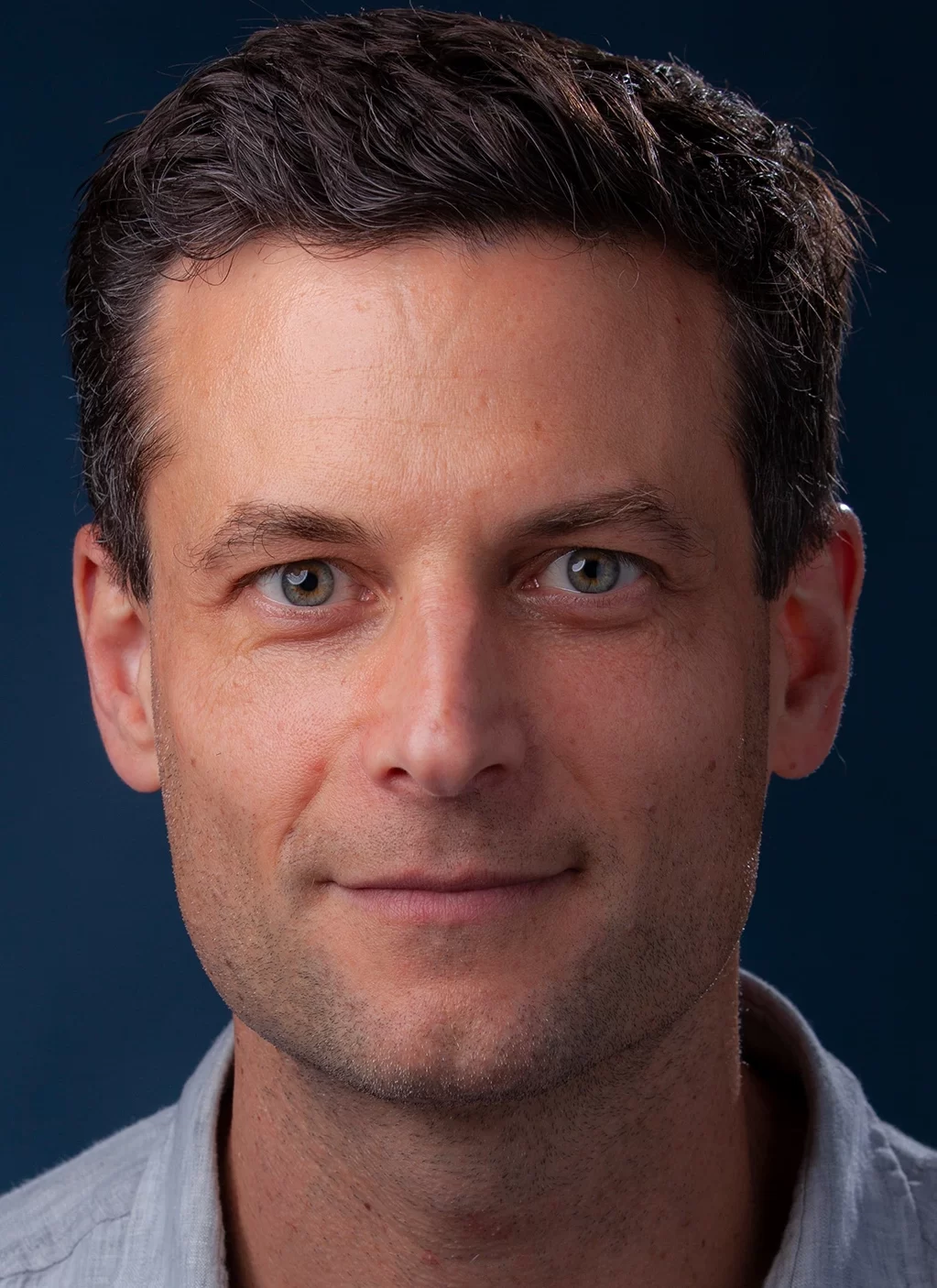 “Her adult son had walked away from home in early March and never came back. She spent months asking police for help finding him.
“Her adult son had walked away from home in early March and never came back. She spent months asking police for help finding him.
‘She searched abandoned homes and made desperate appeals on Facebook. In August, an officer visited and told her that her son hadn’t in fact been missing. He’d been hit by a police car while crossing a nearby highway less than an hour after leaving home.
“It got worse: Authorities had known his name — and hers — soon after he died. But after the body went unclaimed for months (while she was searching for him) he was buried in a pauper’s grave behind the county jail.
“She then had to pay $250 to claim his body.”
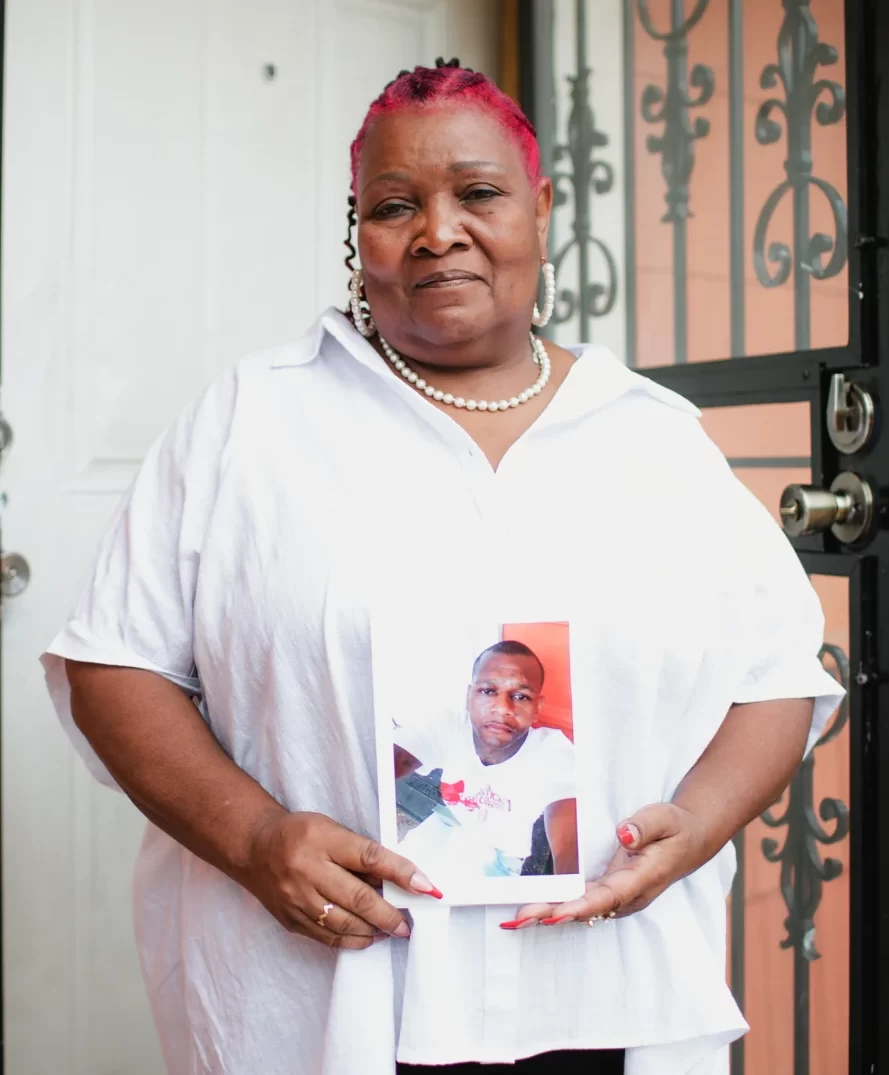 Bettersten Wade (pictured), the mother of Dexter Wade, 37, publicly thanked Schuppe Saturday on MSNBC’s “PoliticsNation” with Al Sharpton for making it a national story. She stood beside civil rights lawyer Benjamin Crump.
Bettersten Wade (pictured), the mother of Dexter Wade, 37, publicly thanked Schuppe Saturday on MSNBC’s “PoliticsNation” with Al Sharpton for making it a national story. She stood beside civil rights lawyer Benjamin Crump.
In reporting the story Oct. 25, updated Oct. 26, Schuppe wrote, “This account has been pieced together with interviews with Dexter’s family and a coroner’s investigator, along with court records and documents provided in response to public records requests: a crash report, incident reports and coroner’s office records. Bettersten also shared personal notes, emails, Dexter’s death certificate, a coroner’s report and case information cards provided to her by police.”
Wade created a GoFundMe page on Oct. 13 to have her son’s body “exhumed with a full independent autopsy along with a proper burial and homegoing. Dexter deserved so much more than being buried in a paupers field grave for the unknown.” It has raised a little over $14,000 with a $100,000 goal.
- Charlie Drape, Mississippi Clarion-Ledger: Civil rights attorney Ben Crump now involved in Dexter Wade case against Jackson MS Police Dept.
- Ashton Pittman, Mississippi Free Press: Jackson Police Buried Woman’s Missing Son In Unmarked Grave Four Years After Brother’s JPD Beating Death (Oct. 26)
- Jon Schuppe, NBC News: A mother reported her son missing in March. Police kept the truth from her for months. (Oct. 25, updated Oct. 26)

NAHJ Honors Report on Moms Fighting Pollution
An NBC News report about Latina mothers joining forces with environmental groups to demand legal action on air quality issues in Chamizal, a neighborhood in south-central El Paso, was awarded the Al Neuharth Award for Investigative Journalism Saturday at the National Association of Hispanic Journalists’ Ñ awards.
Two of the awards — to Centro de Periodismo Investigativo and the Miami Herald — were about domestic violence among police officers.
“According to a report from the Clean Air Task Force, the League of United Latin American Citizens, and the National Hispanic Medical Association, 1.81 million Latinos in the U.S. live within half a mile of an oil and gas facility. What’s worse, about 1.7 million live in counties that face a higher-than-average cancer risk from toxins emitted by those facilities,” reported the website climatepower.us.
“The American Lung Association ranks El Paso as the country’s 13th worst city for ozone pollution, topping places such as New York City and Dallas,” Isa Gutierrez, Jackie Montalvo, Carlos P. Beltran and Albinson Linares of Noticias Telemundo reported in ” ‘Like a dumping ground’: Latina moms in Texas border city are fighting air pollution.”
“The neighborhood of Chamizal hugs the border with Mexico and is home to almost 8,000 people. More than 96 percent of the community identifies as Hispanic/Latino.
“Hilda Villegas, 43, says the area is treated ‘like a dumping ground.’ She lists the busy Interstate 10, the international bridge, a bus depot, an industrial waste recycling facility and a nearby oil refinery as the main culprits. . . .”
The annual awards were presented Friday at a Burbank, Calif., restaurant.
Other winners:
- Radio/Online Audio: Marisol Medina-Cadena, KQED, San Francisco – “From the Soil: Farmworkers Building Fire Resilience“
- Print/Digital: Sandra Lilley, NBC News Digital (NBC Latino) – “Who’s Latino? Amid growing numbers the definition is expanding“
- TV/Online Video: Mireya Villarreal, ABC News – “ABC News Live,” “THC: The Human Cost“
- Elaine Rivera Civil Rights & Social Justice Award: Miriam Jordan, The New York Times – “Abrupt New Border Expulsions Split Venezuelan Families“
- NAHJ/University of Florida Award for Investigative Journalism – Small/Medium Newsroom: Cristina del Mar Quiles, Centro de Periodismo Investigativo – “Cientos de policías arrestados por violencia doméstica pocas veces enfrentan consecuencias” (“Hundreds of Police Officers Arrested for Domestic Violence Rarely Face Consequences”)
- NAHJ/University of Florida Award for Investigative Journalism – Large Newsroom: Syra Ortiz Blanes, Miami Herald – “Domestic violence is rampant among Puerto Rico police officers. Few face consequences”
 Toyota Emerging Journalist Competition: Claudia Rivera Cotto (pictured), Enlace Latino NC, North Carolina – “Embracing Diversity in Journalism“
Toyota Emerging Journalist Competition: Claudia Rivera Cotto (pictured), Enlace Latino NC, North Carolina – “Embracing Diversity in Journalism“
With Jim Trotter Comments, Stephen A. Loses a Fan
“ESPN’s Stephen A. Smith is someone I’ve admired for decades,” Mike Freeman wrote Wednesday for USA Today. “I don’t know Smith well but I’ve always respected him. He’s immensely talented and understands the television universe as well as anyone in that medium. Few people are smarter and it was also inspiring seeing one of a handful of journalist voices of color rise to the top.
“I was never one of these people who believed Smith had sold out. Oh, this has been constantly discussed privately among some in the business. And also publicly by others. But I saw Smith as someone who was adaptive. Not someone who compromised himself for power and money.
“I was wrong.
“There’s no other way to look at what Smith allegedly texted to journalist Jim Trotter as anything other than Smith compromising himself. This isn’t easy to write but it’s important to. It’s important because Smith is one of the most powerful people in all of sports. Not just sports journalism. All of sports. His voice has reach and say. Leagues like the NFL and NBA listen to his every word. He’s friends with owners and star players. He moves markets in ways few others in sports journalism can. People may try and deny it but what he says and does matters.
“He’s become so influential that like Pat McAfee and a handful of others, his power must be examined and chronicled. People with that kind of power must look internally at how they wield it. Apparently, that’s not what Smith (or McAfee) does. What Smith allegedly said to Trotter, who is fighting a significant battle against the NFL that Trotter says discriminated against him was, frankly, shameful.
“An ESPN spokesman told USA TODAY Sports that Smith declined comment for this story. . . .
“Why is all of this important? Smith has a great deal of power, and if Trotter’s words are accurate, Smith sided with one of the most powerful entities in the nation, in the NFL, and ignored the standing of an individual fighting that entity. And allegedly did so in an extremely aggressive and disrespectful manner. Trotter deserves far more than it seems Smith gave him. . . .”
- The Coli: Jim Trotter Calls Out Stephen A. Smith
It’s About Relationships — and Funding
The leaders of Asian American Journalists Association, Indigenous Journalists Association, Journalism and Women Symposium, National Association of Black Journalists, National Association of Hispanic Journalists and the Association of LGBTQ+ Journalists (NLGJA) gathered Oct. 21-22 in Chicago “for leadership training, organizational development, and to ensure stronger cooperation in the future, in order to better serve their communities and increase their collective impact in supporting multicultural democracy,” the groups announced.
A separate meeting was held with funders in New York Oct. 12. “It’s about relationship building,” NABJ Executive Director Drew Berry told an NABJ board meeting last weekend. The New York meeting was held in connection with the “Press Forward” initiative, in which funders committed more than $500 million to help local journalism.
“It was good,” spokesperson Andrew Sherry told Journal-isms, “all the signers of the letter to Press Forward and Jon Funabiki as moderator; he talked about how these organizations were founded not long after the Kerner Commission found the media had some culpability in the civil disorders of 1967 because of the shortcomings of newsrooms that were almost completely white.
“Asked for their ‘origin stories,’ the association leaders almost all mentioned attending their first conference and being stunned to see so many other journalists who looked like them. They stressed how important it is to work together, because diversity is not just important for journalism, it’s important for democracy.”
From left, Funabiki, founder and former director of Renaissance Journalism; Rebecca Landsberry-Baker, executive director of the Indigenous Journalists Association; Berry; Naomi Tacuyan Underwood, executive director of the Asian American Journalists Association; Mythili Sampathkumar, president of the South Asian Journalists Association; and Yvette Cabrera, president of the National Association of Hispanic Journalists.
Short Takes
 Although the News Leaders Association might dissolve, pending a membership vote this month, the diversity survey of news organizations, might find a new home, Alison Gerber (pictured), president of the association, told Journal-isms Friday. “We are working with another organization that has interest in taking over the diversity survey. We’re still in negotiations right now, so I cannot say what organization that is. But we hope to have an announcement fairly soon,” Gerber messaged. “My hope is that it will be within the next month.”
Although the News Leaders Association might dissolve, pending a membership vote this month, the diversity survey of news organizations, might find a new home, Alison Gerber (pictured), president of the association, told Journal-isms Friday. “We are working with another organization that has interest in taking over the diversity survey. We’re still in negotiations right now, so I cannot say what organization that is. But we hope to have an announcement fairly soon,” Gerber messaged. “My hope is that it will be within the next month.”
- “The magazine giant Condé Nast will cut about 5 percent of its work force, backtracking on a much-ballyhooed plan to build up an in-house video studio to tap into Hollywood’s demand for film and TV ideas,” Katie Robertson and Benjamin Mullin reported Wednesday for the New York Times. The layoffs will affect about 270 employees.” Conde Nast publishes such brands as the New Yorker, Vogue, Vanity Fair, Bon Apetit and Wired.
 “Almost five years ago, I founded Sahan Journal to become the first nonprofit newsroom dedicated to immigrants and communities of color in Minnesota. Today, I’m writing to share some important news: I’m planning to step down as CEO and publisher, and help start a thoughtful and inclusive leadership transition,” Mukhtar M. Ibrahim (pictured), announced to readers Monday. “I believe the time is right to find a new leader for one of the country’s most innovative nonprofit newsrooms.” Ibrahim said. “Balancing the needs of a growing family and a growing organization is no small task . . . We have plans to expand our community engagement events, a central part of our mission to forge deep connections with the communities we serve. We hope to extend our reach to readers beyond the Twin Cities metropolitan area. We’re investing in new and existing platforms to meet the diverse needs of younger news audiences. . . . “
“Almost five years ago, I founded Sahan Journal to become the first nonprofit newsroom dedicated to immigrants and communities of color in Minnesota. Today, I’m writing to share some important news: I’m planning to step down as CEO and publisher, and help start a thoughtful and inclusive leadership transition,” Mukhtar M. Ibrahim (pictured), announced to readers Monday. “I believe the time is right to find a new leader for one of the country’s most innovative nonprofit newsrooms.” Ibrahim said. “Balancing the needs of a growing family and a growing organization is no small task . . . We have plans to expand our community engagement events, a central part of our mission to forge deep connections with the communities we serve. We hope to extend our reach to readers beyond the Twin Cities metropolitan area. We’re investing in new and existing platforms to meet the diverse needs of younger news audiences. . . . “
 “Latino, multicultural news outlet AL DÍA in Philadelphia has launched AL DÍA Magazine, a membership-based digital and print publication,” Talking Biz News reported. “The magazine will include news analysis, features on topics including education and culture, op-eds and more. The articles will also contain a QR code, thus, by accessing it, readers will be able to read the content online in American English and ‘Standard U.S. Spanish.’ ‘AL DÍA has evolved over its 29 years history,’ publisher Hernán Guaracao said. ‘What started as a newsletter in my home, evolved into a weekly newspaper and now a magazine. Shifting U.S. demographics, increased online readership, shrinking ad budgets and the high cost of print manufacturing and distribution helped drive the change.’ . . . ”
“Latino, multicultural news outlet AL DÍA in Philadelphia has launched AL DÍA Magazine, a membership-based digital and print publication,” Talking Biz News reported. “The magazine will include news analysis, features on topics including education and culture, op-eds and more. The articles will also contain a QR code, thus, by accessing it, readers will be able to read the content online in American English and ‘Standard U.S. Spanish.’ ‘AL DÍA has evolved over its 29 years history,’ publisher Hernán Guaracao said. ‘What started as a newsletter in my home, evolved into a weekly newspaper and now a magazine. Shifting U.S. demographics, increased online readership, shrinking ad budgets and the high cost of print manufacturing and distribution helped drive the change.’ . . . ”
- Arnold Diaz, a brash investigative reporter at three New York City television stations who brought righteous passion to segments that shamed con artists, business owners, scammers, government bureaucrats and others who ripped off consumers, died on Oct. 24 in Greenwich, Conn,” Richard Sandomir reported Wednesday, updated Saturday, for The New York Times. “He was 74. The cause of the death, at a hospital, was multiple myeloma, a blood cancer, his son, Alex, said. . . .”
- “A new podcast from WITF aims to reach an underserved audience by putting a spotlight on the experiences of people of color living in midstate Pennsylvania,” Mina Allen reported for Current. “The Harrisburg station launched The Melanin Report Sept. 4. In three episodes each week, host Marquis Lupton covers top headlines and leads interviews and discussions about successes and challenges encountered by the local Black, Indigenous and People of Color community. . . .”
- “A group of New Jersey journalists and news outlets have built the state’s first collaborative voter guide, which focuses on the 120 state senate and assembly races,” the American Press Institute reported. “The collaborative — coordinated by the Center for Cooperative Media at Montclair State University and NJ Spotlight News — had a goal of obtaining questionnaire answers from all 246 candidates vying for state election. In the end, they had a 41% response rate. The final guide included stories and videos translated into Chinese, Turkish, Spanish, Urdu and Korean, and partner websites translated individual questionnaire answers into languages relevant to certain communities. . . .”
 “Adrienne Broaddus (pictured) has joined NBC News as a correspondent,” Michael Malone reported for Broadcasting & Cable. “She will be based in Chicago. She comes from CNN, where she was a correspondent, and covered the pandemic and mass shootings in Uvalde, Texas; Oxford, Michigan; and Highland Park, Illinois. She also extensively covered policing in America. . . .”
“Adrienne Broaddus (pictured) has joined NBC News as a correspondent,” Michael Malone reported for Broadcasting & Cable. “She will be based in Chicago. She comes from CNN, where she was a correspondent, and covered the pandemic and mass shootings in Uvalde, Texas; Oxford, Michigan; and Highland Park, Illinois. She also extensively covered policing in America. . . .”
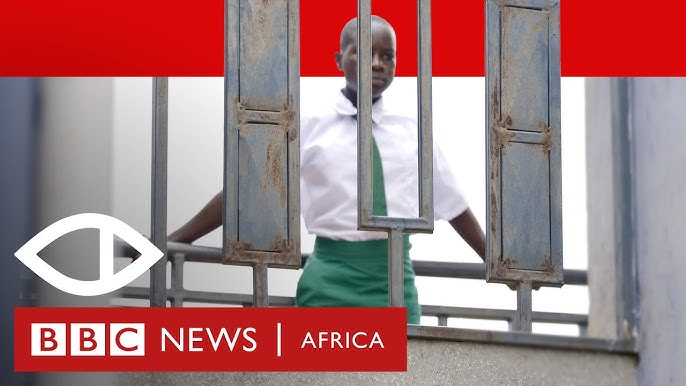
- “Caleb Mwangi was beaten so severely at his school in Kenya after he took extra food at breakfast that he was put into an induced coma and spent 11 days in an intensive care unit,” Tom Odula and Tamasin Ford of BBC Africa Eye reported in introducing a story Monday headlined, “Kenya’s school floggings: The children suffering from a hidden epidemic.” ” ‘When I got there, he couldn’t leave his bed. He couldn’t speak,’ his father Fred Mwangi told the BBC. “Corporal punishment in schools has a long history in Kenya, dating back to the era when missionaries and colonisers relied on it to assert their authority. In 2001, the Kenyan government banned the practice in schools, but it has been harder to change people’s attitudes. . . .”
- “El Salvador’s Congress repealed a law on Wednesday that criminalized the publication of gang messages, as ruling party leaders declared victory in their war against criminal groups,” Gerardo Arbaiza reported Thursday for Reuters. He also wrote, “Lawmakers passed the reform to target anyone who spread or otherwise reproduced graffiti “or any form of visual expression” attributed to gangs, including Mara Salvatrucha and its rival Barrio 18. The law’s critics argued it unjustly targeted journalists, who often source stories based on images showing graphic violence, including messages left by alleged gang members, or even interviews, graffiti and audios shared on social media. . . .”
- In Bangladesh on Oct. 28, “at least 27 journalists covering rallies in the capital of Dhaka were attacked by supporters of the main opposition Bangladesh Nationalist Party and the ruling Awami League party, as well as police,” the Committee to Protect Journalists reported, citing local press freedom group Bangladeshi Journalists in International Media, several journalists who spoke to CPJ, and various news reports. The committee called for an immediate and impartial investigation.
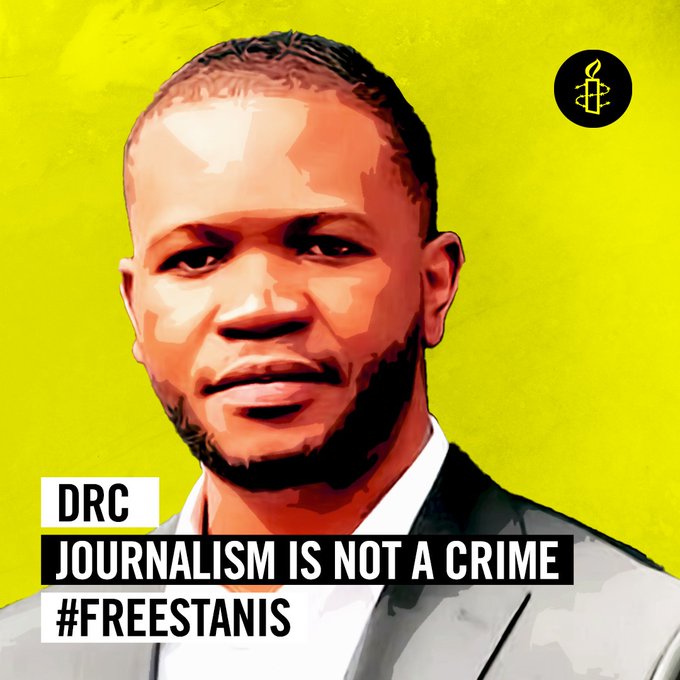 “A reporter held in the Democratic Republic of Congo since 8 September is due to appear in court again on 3 November on a clearly trumped-up charge of fabricating an intelligence agency memo and sending it to Jeune Afrique, the Paris-based news magazine he works for. Several sources confirmed to Reporters Without Borders (RSF) that the memo really was written by the DRC’s National Intelligence Agency (ANR),” Reporters Without Borders said Wednesday. On Friday, Jeune Afrique reported that the trial of the reporter, Stanis Bujakera Tshiamala (pictured), would resume in two weeks.
“A reporter held in the Democratic Republic of Congo since 8 September is due to appear in court again on 3 November on a clearly trumped-up charge of fabricating an intelligence agency memo and sending it to Jeune Afrique, the Paris-based news magazine he works for. Several sources confirmed to Reporters Without Borders (RSF) that the memo really was written by the DRC’s National Intelligence Agency (ANR),” Reporters Without Borders said Wednesday. On Friday, Jeune Afrique reported that the trial of the reporter, Stanis Bujakera Tshiamala (pictured), would resume in two weeks.
- “A toll free number to receive complaints about offensive broadcast contents has been launched in Accra,” Claude Nyarko Adams reported Thursday for the Ghanaian times. “The menace of money-doubling, open promotion of ritual murders, alcohol advertisements during the day and other offensive contents have been on the rise on our broadcast platforms,” Minister of Information Kojo Oppong Nkrumah said. we want to preserve our sanity against these menace, we need to guard what keep the media space safe. This toll free number gives the public the power to report these contents for the necessary action to be taken” by the National Media Commission. he said.
To subscribe at no cost, please send an email to journal-isms+subscribe@groups.io and say who you are.
Facebook users: “Like” “Richard Prince’s Journal-isms” on Facebook.
Follow Richard Prince on Twitter @princeeditor
Richard Prince’s Journal-isms originates from Washington. It began in print before most of us knew what the internet was, and it would like to be referred to as a “column.” Any views expressed in the column are those of the person or organization quoted and not those of any other entity. Send tips, comments and concerns to Richard Prince at journal-isms+owner@
View previous columns (after Feb. 13, 2016).
View previous columns (before Feb. 13, 2016)
- Diversity’s Greatest Hits, 2018 (Jan. 4, 2019)
- Book Notes: Is Taking a Knee Really All That? (Dec. 20, 2018)
- Book Notes: Challenging ’45’ and Proudly Telling the Story (Dec. 18, 2018)
- Book Notes: Get Down With the Legends! (Dec. 11, 2018)
- Journalist Richard Prince w/Joe Madison (Sirius XM, April 18, 2018) (podcast)
- Richard Prince (journalist) (Wikipedia entry)
- February 2018 Podcast: Richard “Dick” Prince on the need for newsroom diversity (Gabriel Greschler, Student Press Law Center, Feb. 26, 2018)
- Diversity’s Greatest Hits, 2017 — Where Will They Take Us in the Year Ahead?
- Book Notes: Best Sellers, Uncovered Treasures, Overlooked History (Dec. 19, 2017)
- An advocate for diversity in the media is still pressing for representation, (Courtland Milloy, Washington Post, Nov. 28, 2017)
- Morgan Global Journalism Review: Journal-isms Journeys On (Aug. 31, 2017)
- Diversity’s Greatest Hits, 2016
- Book Notes: 16 Writers Dish About ‘Chelle,’ the First Lady
- Book Notes: From Coretta to Barack, and in Search of the Godfather
- Journal-isms’ Richard Prince Wants Your Ideas (FishbowlDC, Feb. 26, 2016)
- “JOURNAL-ISMS” IS LATEST TO BEAR BRUNT OF INDUSTRY’S ECONOMIC WOES (Feb. 19, 2016)
- Richard Prince with Charlayne Hunter-Gault, “PBS NewsHour,” “What stagnant diversity means for America’s newsrooms” (Dec. 15, 2015)
- Book Notes: Journalists Follow Their Passions
- Book Notes: Journalists Who Rocked Their World
- Book Notes: Hands Up! Read This!
- Book Notes: New Cosby Bio Looks Like a Best-Seller
- Journo-diversity advocate turns attention to Ezra Klein project (Erik Wemple, Washington Post, March 5, 2014)

